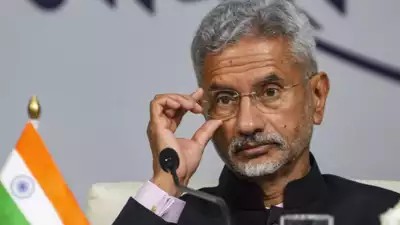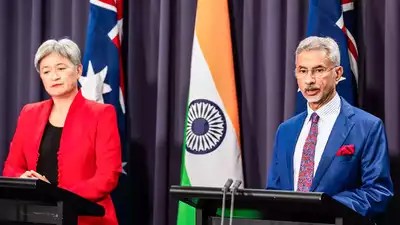Indian consular camps in Canada have been cancelled after Canadian authorities cited security concerns, following a rise in tensions between the two countries.

India has condemned Canada’s decision to block an Australian news outlet from airing a press conference by Indian Foreign Minister S. Jaishankar, accusing the move of displaying ‘hypocrisy towards free speech.’
Bilateral ties between New Delhi and Ottawa plunged to a new low after Canada blocked an Australian news outlet which aired a press conference by External Affairs Minister S Jaishankar and his Australian counterpart Penny Wong in Canberra where he made some strong remarks on the India-Canada standoff.
Stating it was “surprised” over the “strange” Canadian move, the Ministry of External Affairs said the action “yet again highlights the hypocrisy of Canada towards freedom of speech”.
Incidentally, Canada and Australia are part of the Five Eyes intelligence sharing alliance that also includes the US, UK and New Zealand.
The MEA also announced cancellation of some scheduled consular camps in Canada, saying Canadian authorities had conveyed their inability to provide security to the organisers.
Hours after The Australia Today aired Jaishankar’s joint press conference with Wong in Canberra, where he voiced concern over the political space being granted to Khalistan extremists in Canada and noted that India had raised the matter with Australia, several users in Canada complained of the news outlet being blocked and questioned the timing.

In New Delhi, responding to a question on the blocking of The Australia Today, Randhir Jaiswal, spokesperson for the Ministry of External Affairs, said, “We understand that the social media handles and pages of this particular outlet, which is an important diaspora outlet, have been blocked and are not available for viewers in Canada. This happened just an hour or a few hours after this particular handle carried the press conference of S Jaishankar along with Penny Wong, and the outlet also had several articles on the (Australia) visit of the External Affairs Minister, as also an interview of him. We were surprised. It looks strange to us.”
“But, nonetheless, what I will say is that these are actions which yet again highlight the hypocrisy of Canada towards freedom of speech,” Jaiswal said, also enumerating the three points made by Jaishankar in his response to a question on India-Canada ties.
In Canberra, Jaishankar, in remarks on the Canadian allegations against India over the killing of Khalistan separatist Hardeep Singh Nijjar, had reiterated that Canada made the allegations without providing specifics and that it was unacceptable for India that its diplomats were put under surveillance.
Jaishankar also said India believes in freedom and it should not be misused, and that India had brought this up with the Australian side.
Jaiswal said, “So you can draw your conclusions from that, why The Australia Today channel was blocked by Canada.”
Media Reaction and Public Backlash
The block on the Australian news outlet has also drawn attention from global media watchdogs and journalists. Many have expressed concern that the move sets a dangerous precedent for media freedom in democratic nations. “It is deeply troubling when a country that prides itself on democratic ideals intervenes to restrict the press from performing its role,” said a representative from the Committee to Protect Journalists (CPJ).
In India, the response has been overwhelmingly critical of Canada’s actions. Several prominent Indian media outlets have expressed solidarity with the Australian broadcaster and have raised questions about Canada’s commitment to democratic principles. On social media, the hashtag #FreeSpeechHypocrisy has been trending, with many Indian users highlighting the contradiction between Canada’s public stance on freedom of expression and its actions against the press.
What’s Next?
As tensions continue to simmer, the India-Canada diplomatic relationship faces further uncertainty. While the Canadian government’s response will likely be scrutinized by international observers, India has made it clear that it will not tolerate actions that undermine its sovereignty or the free flow of information. India’s commitment to strengthening its global voice may lead to a more assertive diplomatic stance on the international stage, as it seeks to ensure that its interests, including media access, are fully respected.
The fallout from this incident also underscores the broader geopolitical shift in the way international relations are shaped, with media freedom increasingly being used as a tool of diplomatic leverage. As both countries navigate their complex relationship, the issue of press freedom and the blocking of international news outlets could become an ongoing point of contention, with far-reaching implications for their future engagements on the global stage
Pingback: Janhvi Kapoor is shooting for her film, RC 16 with RamCharan in Hyderabad | Troll Daily